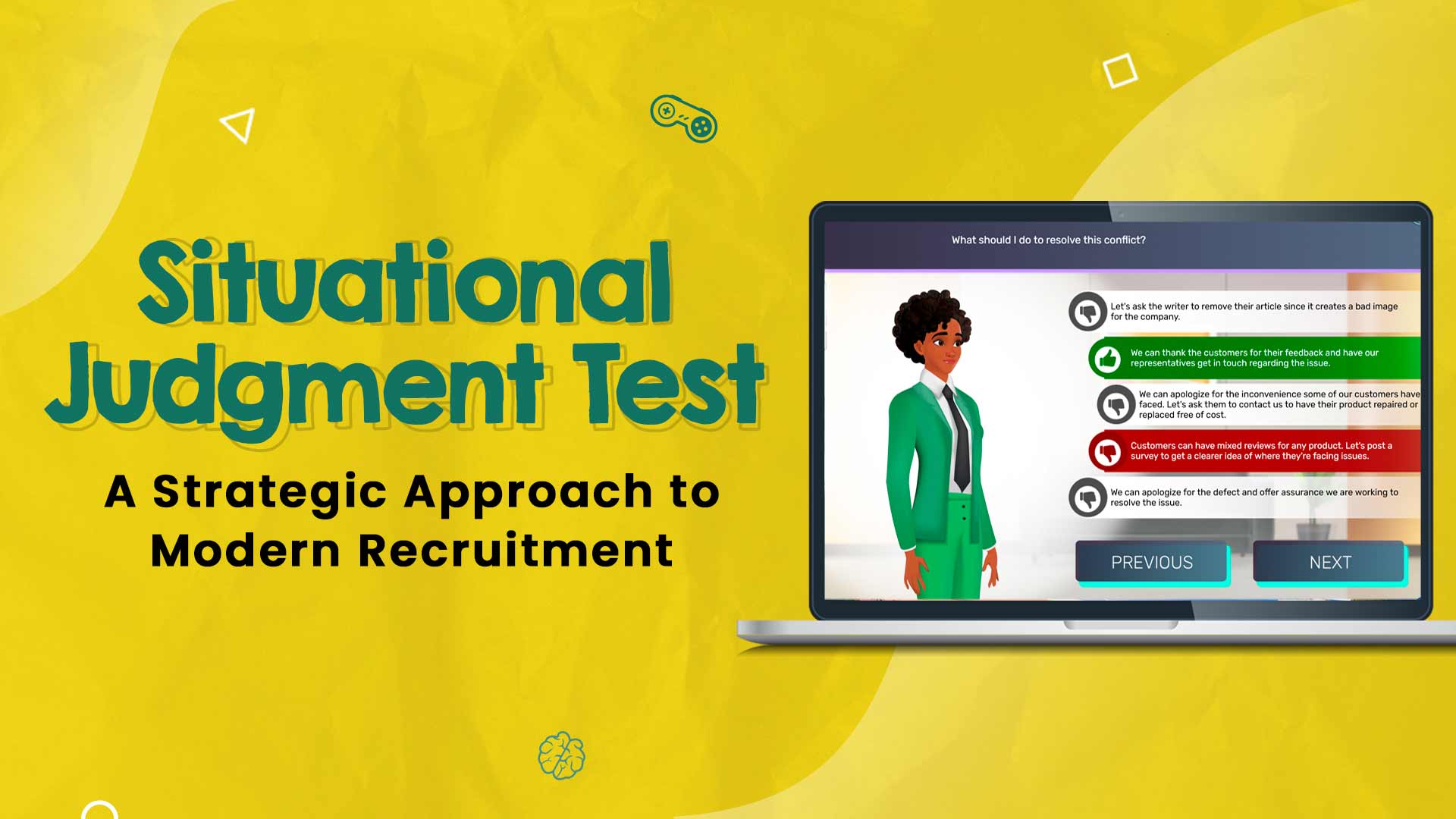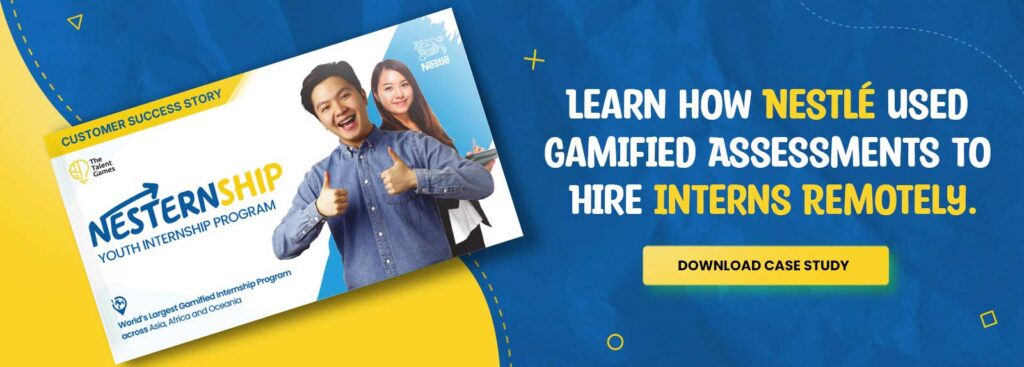Discover the Value of Situational judgment tests and take the competitive edge in Modern Recruitment in 2025 and beyond. Learn how these tests offer unique insights into candidates’ abilities for making well-informed hiring choices in the job market that is currently going through a massive talent shortage.
Imagine a bustling cafe where two job applicants find themselves in an unexpected predicament.
Charles, a fresh graduate, and Stephanie, a seasoned marketer, are vying for the same role.
Suddenly, the coffee machine inside the cafe sputters, filling the air with smoke.
How both candidates respond to this situation reveals a lot about their decision-making skills and suitability for the job.
Just like this scenario, Situational Judgement Tests (STJ) place applicants in real-world situations to assess their problem-solving skills.
STJs have emerged as a strategic tool in modern recruitment processes, allowing employers to gauge the candidates’ aptitude for potential challenges.
This guide will dig into the benefits of STJs and their role in revolutionizing recruitment.
What Are Situational Judgement Tests?
Situational Judgement Tests (STJs) are like role-playing puzzles in hiring.
They present candidates with realistic scenarios mirroring workplace challenges. These situations can be anything from a team conflict to a customer complaint.
The participants are then asked to choose the best course of action from numerous options.
This helps hiring managers delve beyond candidates’ qualifications and know how they approach problems, communicate, and navigate ethical dilemmas.
A few organizations conduct them in paper and pencil mode, while others opt for interview questions or video-based methods.
Overall, this method gives a sneak peek into their decision-making prowess, helping employers identify individuals who possess a strategic mindset to thrive in the complexities of a fast-paced work environment.
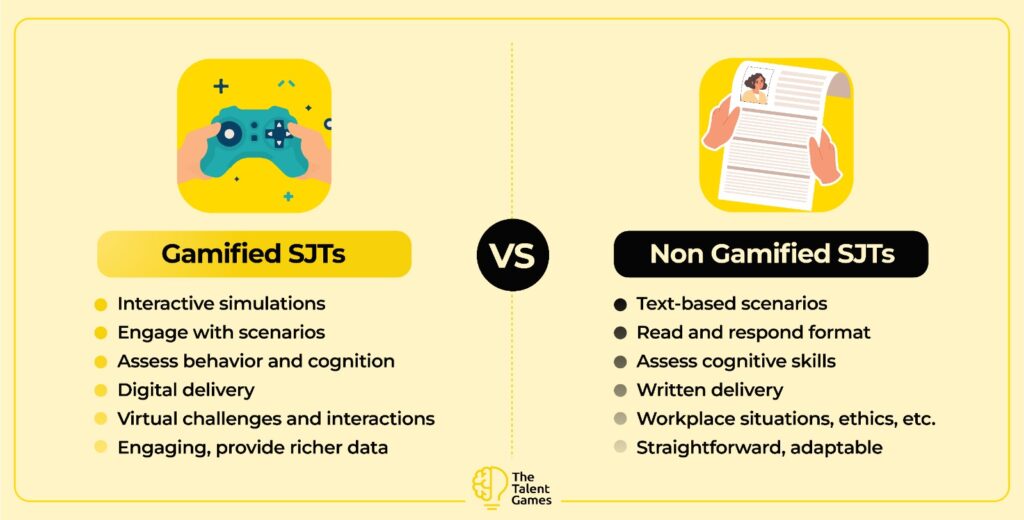
What are Benefits of Using Situational Judgement Tests?
Companies have been increasingly using STJs to judge employees’ capabilities in the workplace. However, they’ve also been used as a valuable tool in various other assessment scenarios.
We’ll break down a few advantages below:
Fairness and Inclusivity
Think of STJs as a level playing field for everyone involved. They present real-life scenarios where people have to make decisions.
These assessments do not discriminate based on personal experience or background.
Instead, focus on a person’s ability to make efficient decisions in complicated situations.
Someone with minimal professional experience might perform better than someone with years of experience.
Since the purpose is solely to discover a person’s decision-making skills, the outcome remains unbiased and fair.
Improving fairness level boosts employee performance by 26% and retention by 27%, according to Harvard Business review
Assessment of Practical Skills
Oftentimes, people say, “I’ve got the theory down, but can I actually do it?”
STJs address precisely that.
They measure your ability to apply knowledge in real scenarios. It’s like showing your skills in action rather than listing them on the same resume.
So, if you’re being considered for a job, an STJ might ask how you’d handle a teamwork challenge or a tricky customer.
At this point, you have to prove whether you can walk the talk.
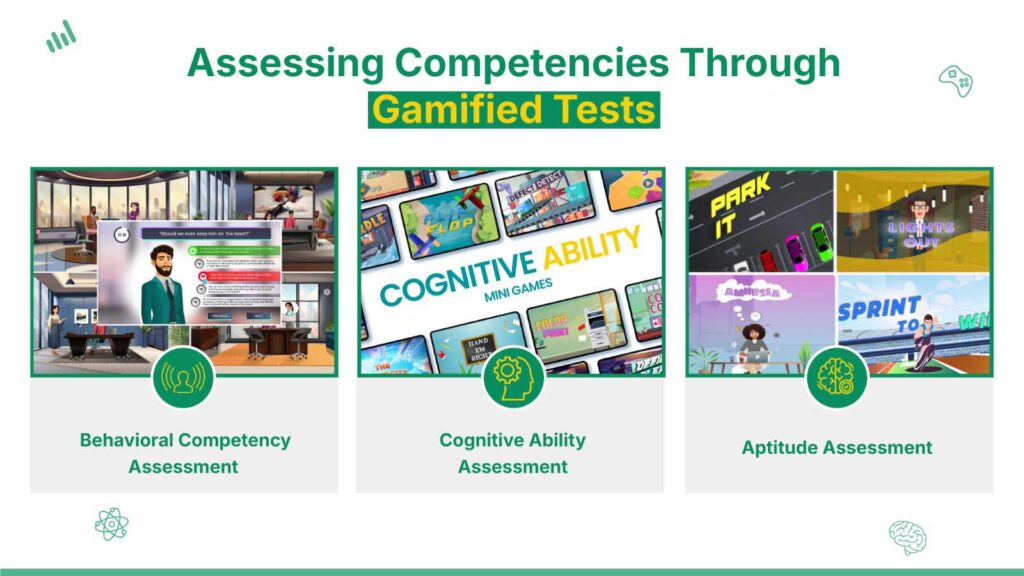
Predictive Validity
Think of STJs as a sort of glimpse into the future.
Why? Because they help determine how you’d tackle practical challenges in the real world.
In other words, if you shine in an STJ, chances are you’d likely excel when encountering such situations.
This predictive quality of STJ offers substantial benefits to employers looking for people who can handle their roles with precision and skill.
Efficient Screening
Time is precious, and STJs are designed to make the most out of it. They help employers cover a lot of ground in a relatively short time.
For instance, they can sift through a pool of candidates efficiently and quickly.
It’s like understanding a person’s decision-making and problem-solving skills without dragging out an extensive interview process.
Not only does it benefits the hiring teams but also the candidates.
Examples of Situational Judgement Tests
Situational Judgement Tests are designed to show your thought process and whether your skills align with a particular role.
Below, we’ll walk you through specific examples of different STJs.
Job Interview SJT
Although resume highlights candidates’ skills, they do not give an insight into their practical abilities. Here’s when Situational Judgement Tests come in handy.
Imagine an interview for a customer service position. Here’s a possible question to test a candidate’s essential skills.
“You receive a call from an angry customer about a damaged product. They’re furious and demanding an immediate replacement. How will you handle the situation?”
This will help gauge how the applicant will handle customer interactions under pressure and how well they prioritize solutions while keeping customer satisfaction primary.
Assessing Candidates for Management Trainee Programs
STJs are also helpful when considering people for managerial roles.
For instance, someone seeking this role in a project management firm might get asked to respond to the following scenario: “You have limited resources and two crucial projects with tight deadlines. One project is for a high-profile client, while the other is a new initiative with potential long-term benefits. How would you allocate resources?”
This will assess a candidate’s ability to balance short-term gains with long-term strategies, showing their decision-making skills in a managerial context.
Medical School Admission SJT
Students applying for medical schools can come across scenarios like, “You’re a medical intern, and you notice a colleague mishandling a patient’s medication. The patient’s safety might be at risk. What steps will you take?”
This situation will delve into a student’s communication skills, ethical considerations, and dedication to patient care – all crucial aspects of being a responsible medical professional.
SJTs for Admission in an Institution
People in educational settings can also use Situational Judgement Tests to determine an applicant’s skills.
For instance, the hiring manager might ask the following question from someone applying for a teaching program, “In your classroom, you have a student who struggles to concentrate due to frequent distractions. How do you create an environment conducive to their learning?”
This test will help evaluate the prospective teacher’s creativity, adaptability, and empathy, displaying how they’d address such challenges in a classroom setting.
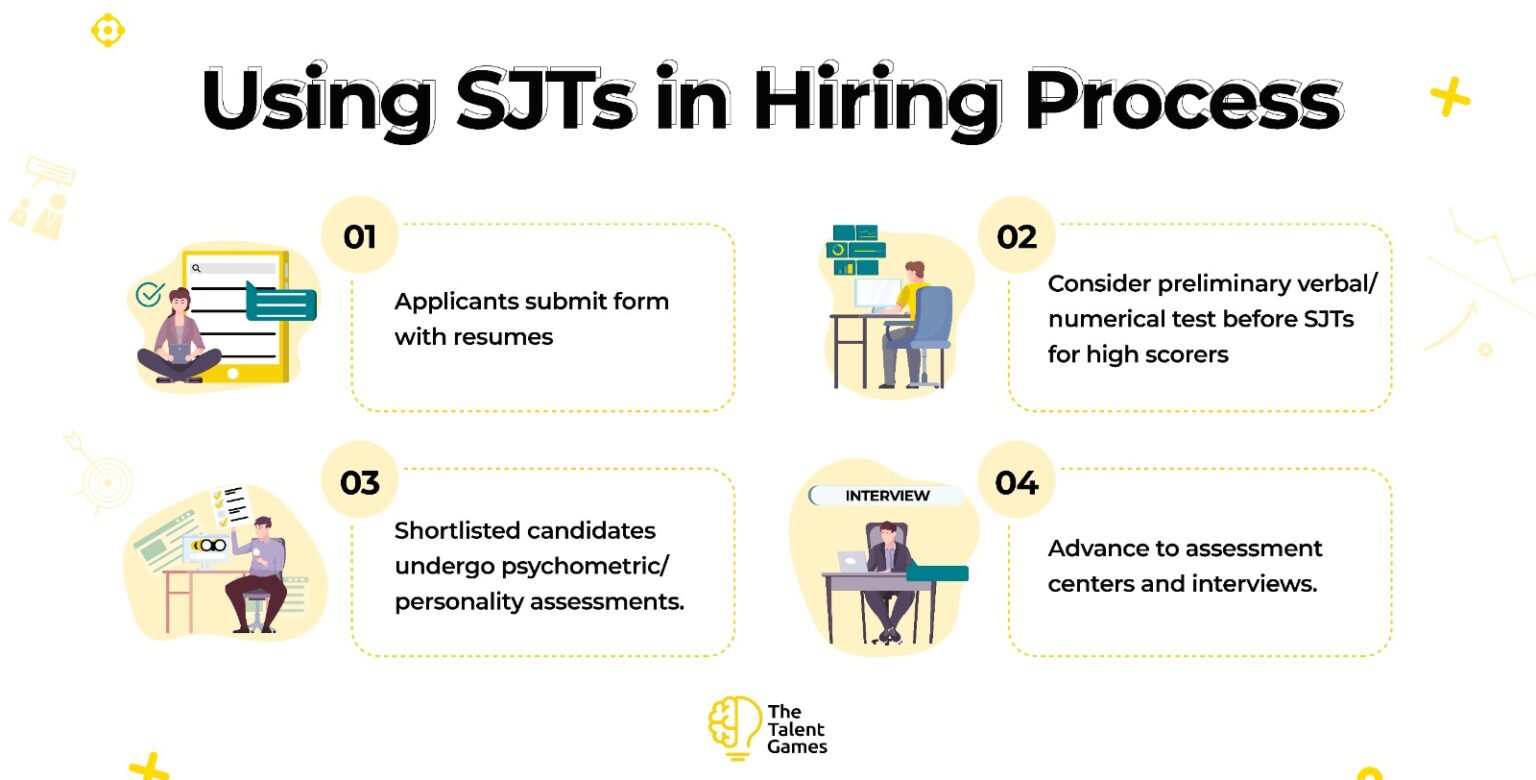
Accuracy of Situational Judgement Testing
Someone seeking to leverage STJs might wonder, “Do they hit the mark?” The good news is they’re pretty accurate. Here’s how:
• Predictive power
National Institutes of Health research highlights that Situational Judgement Tests are valid and reliable. This implies employers can get a solid idea of how a candidate will handle job-related scenarios. This predictive ability isn’t a shot in the dark but rather grounded in research that links STJ performance to on-the-job success.
• Holistic assessment
STJs aren’t one-size-fits-all tests. They’re customized to suit each role. These tests can determine numerous skills, from interpersonal skills to critical thinking and ethical considerations. By evaluating the test taker in various scenarios, STJs provide a well-rounded view of their abilities leading to an accurate assessment.
• Real-life situations
Situational Judgement Tests aren’t trivia questions or abstract riddles. Instead, they mirror challenges someone might encounter in the role they’re being evaluated for. Since they’re closely aligned with the job’s demands, a candidate’s response provides a tangible glimpse into their problem-solving approach.
• Fairness
STJs are unbiased and equitable. Because they do not favor any gender, experience level, or background, the results accurately assess a participant’s abilities.
Gamified Situational Judgement Assessments
Gamified Situational Judgement Tests take a creative and engaging approach to assessing an individual’s decision-making abilities in various situations.
Imagine blending the thrill and interactivity of a video game with the practicality of situational judgement assessments – that’s precisely what gamified assessments are.
During these tests, instead of conventional question formats, participants are involved in interactive and dynamic situations that mimic situations they may face in their professional settings.
These scenarios might be presented through animations, visually appealing graphics, and narrative elements.
Participants are then asked to make decisions, solve problems, or select a specific course of action. Each choice they make leads to a different outcome, simulating cause and effect nature of decision-making.
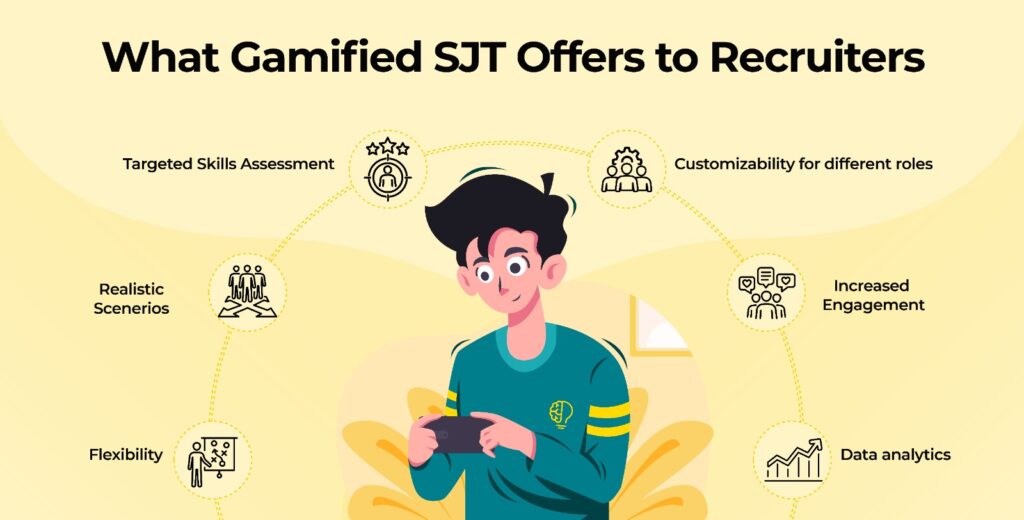
Impacts of Gamified Situational Judgement Tests
There are numerous reasons why game-based SJTs have become one of the most effective modern recruitment approaches.
• Reveal soft skills
Games are more than just winning or losing – they’re about teamwork, adaptability, and strategy. Gamified STJs can unveil an individual’s intangible qualities like empathy, communication, problem-solving, and more.
• Learning through play
Ever heard the phrase, “learn by doing?” Gamified Situational Judgement Assessments take that to heart. Instead of only talking about handling situations, participants perform actions.
• Immediate feedback
Gamified STJs do not require you to wait for feedback or a score. Instead, the candidates and the employers can see the results right away. This is a win-win situation as it saves the time of both parties.
• Boost engagement
People love games because they’re engaging. Gamified STJs tap into that excitement. By presenting scenarios in an interactive way, they keep the assessment intriguing. It isn’t about staring at a blank page and thinking about the answer but making decisions through your actions in a virtual world.
• Skyrockets your employer brand
The candidates love the innovative approach of game-based assessment because it is engaging and entertaining and they share it with colleagues. This gives your brand a competitive edge in the market.
How to Practice Situational Judgement Assessments
Practicing Situational Judgement Assessments can significantly enhance one’s performance and skills in real-life scenarios. Here are a few steps you can take to hone your abilities.
• Know the format
Begin by familiarizing yourself with the format and structure of the assessment. Will your test be paper-based, gamified, or in the form of an interview? What will be the feedback mechanism? Knowing this will help you approach the assessments confidently.
• Be realistic
Because SJTs are designed to mirror real-world situations, approach each situation as if you’re encountering it professionally or personally. Think about the decision you’d genuinely make in a particular case.
• Collect resources
Search for practice materials online, including mock tests, sample questions, and even official resources (if available). Some online platforms also offer practice tests to sharpen your skills before appearing in the actual test.
• Evaluate situations
Make sure you read each situation carefully. Understand the context, the people involved, and the potential consequences of different actions. When you take the time to absorb information, you’re more likely to make an accurate decision.
• Prioritize skills
Situational Judgement Assessments assess a blend of soft and cognitive skills. Therefore, it’s wise to prioritize skills like teamwork, communication, empathy, and ethical considerations. These will significantly impact your responses in real-life scenarios.
• Select carefully
Choose the option that best aligns with your values, the situation, and the skills required for your role. Avoid overthinking and trust your gut, as these tests aim to gauge your natural responses.
Best Situational Judgement Testing Providers
Several online platforms provide Situational Judgement Tests for you to assess a candidate’s abilities. Here are a few examples:
C-Factor by The Talent Games
C Factor, the turnkey solution of The Talent Games, comprises Aptitude Assessments, Psychometric Assessments, Cognitive Ability games, and Situational Competency-Based Assessments.
These Situational judgment tests are highly engaging, work-related, and realistic previews drawing upon The Talent Games’ expertise in psychometrics and the latest technologies.
If you are looking for a high-volume recruitment solution, then you can customize The Talent Games SJTs to your own corporate objectives and branding.
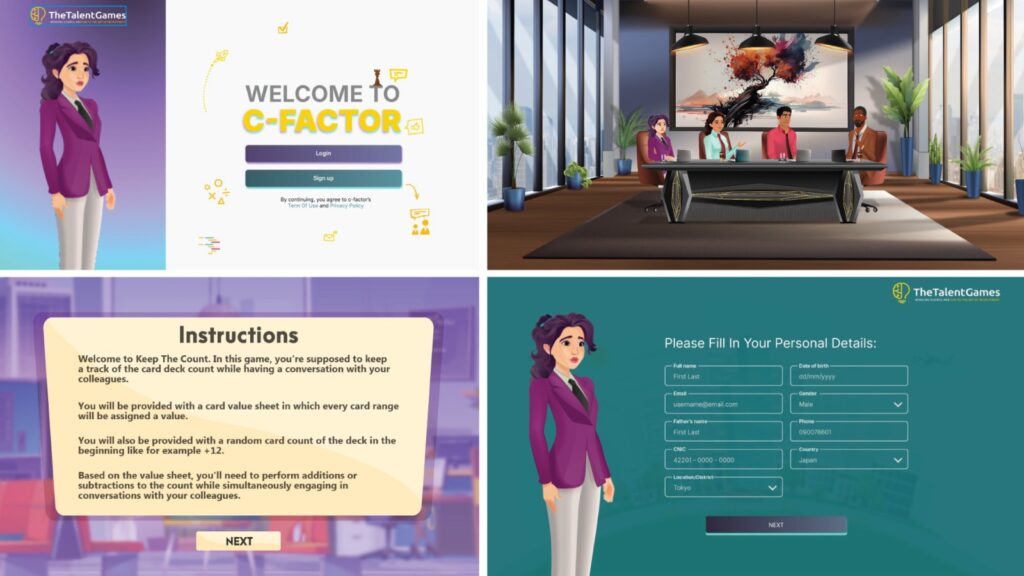
The SJTs by The Talent Games blend artificial intelligence and neuroscience to eliminate hiring bias and provide equal opportunities to aspiring job candidates.
The platform surveyed 7000 students who played the game, and 91% said it depicted real work scenarios.
Here are the key benefits of The Talent Games SJTs you can get:
- Immersive Assessment Experience
Assess candidates within realistic scenarios reflective of their prospective roles, fostering a positive and engaging candidate journey.
- Brand Alignment and Enhancement
Fully aligns with your organization’s branding and objectives, elevating your employer brand by delivering a customized and tailored experience.
- Rapid and Precision Candidate Screening
Swiftly and effectively sift through large candidate volumes utilizing our robust Wave framework and comprehensive aptitude test portfolios, ensuring accuracy in candidate evaluation.
The reliability of C-Factor gamified tests has encouraged numerous companies to leverage it and hire suitable candidates for specific job roles.
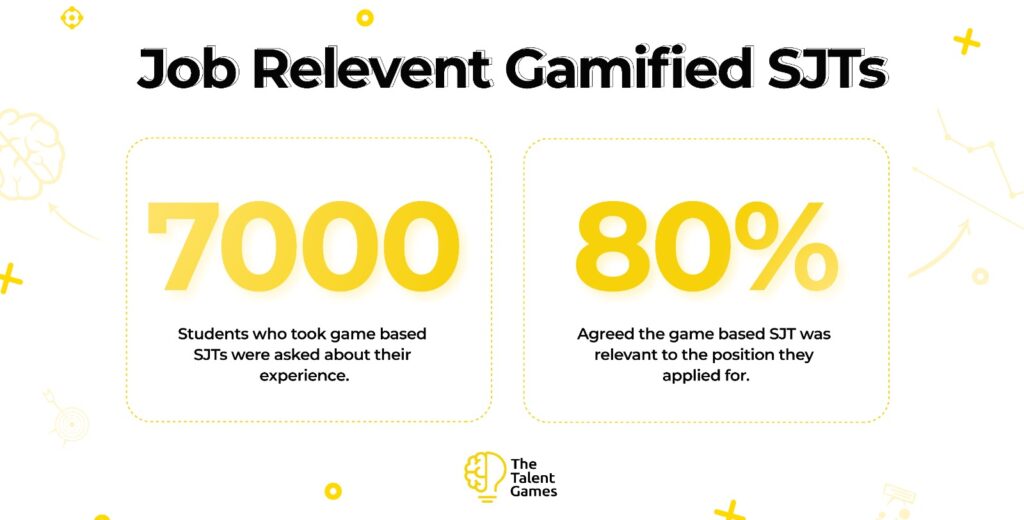
Read more: 7 Benefits of Gamified Hiring for Candidates
Talent Q
Talent Q is yet another platform that lets you practice Situation Judgement Tests. They have been designed to determine how you’d respond to common workplace challenges.
The candidate is presented with numerous scenarios and asked to choose their preferred response from a list.
A candidate’s response showcases whether they’re fit for a particular role.
Graduates First
GraduatesFirst also offers exclusive Situational Judgement Practice Tests that present challenging work-life situations. You can also practice against the clock, track your progress, and access worked solutions.
Besides, the platform shares expert tips to enhance your learning. You can also reach out to customer support if you need any help – it’s free and available 24/7.
Cubiks
If you seek to avoid the hassle of extensive sign up processes, Cubiks is the way to go.
This platform offers quick access to Situational Judgement Tests, exploring different work scenarios.
It shares example questions and presents options for you to choose from. You can also read assessment tips on the site to ensure you are fully prepared and confident for the test day.
Conclusion
Situational Judgement Tests (STJs) add a narrative of innovation in the recruitment industry.
They transcend the confines of traditional testing, placing candidates in the center of authentic situations.
Not only do they reveal an individual’s cognitive abilities but also their interpersonal skills, problem-solving, and ethical considerations.
As companies yearn for employees who excel beyond the theoretical, STJs offer a panoramic view of a candidate’s potential. If you seek to keep the tests more compelling and efficient, you can opt for gamified STJs.
They offer a compelling way to unveil a candidate’s potential while reducing time through immediate results and keeping the participants engaged.
